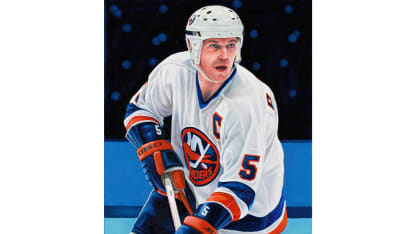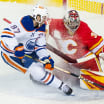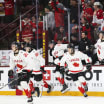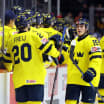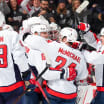As part of the NHL Centennial Celebration, renowned Canadian artist Tony Harris will paint original portraits of each of the 100 Greatest NHL Players presented by Molson Canadian as chosen by a Blue Ribbon panel. NHL.com will reveal two portraits each Monday in 2017.
This week, the portraits of forward Mike Gartner and defenseman Denis Potvin are unveiled in the 43rd installment.
Gartner, Potvin portraits unveiled
Color paintings of 100 Greatest NHL Players will be revealed on NHL.com every Monday in 2017
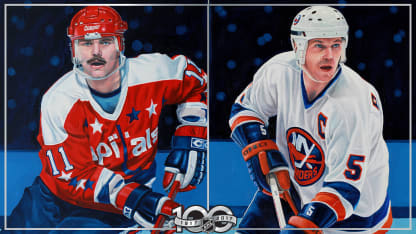
By
NHL.com @NHLdotcom
If the NHL were ever to establish an award for the winner of the fastest skater competition during All-Star Weekend, naming it after Mike Gartner would be appropriate.
Gartner was faster than fast. Not only that, but he could handle the puck, pass and get off shots at full speed. Seeing him flying down right wing was a sight that made defensemen cringe and goaltenders shudder. He could score from distance or from in close, and he was more than winning to go to the front of the net.
During 19 NHL seasons before retiring in 1998, Gartner piled up 708 goals. He's seventh on the all-time list behind Wayne Gretzky, Gordie Howe, Jaromir Jagr, Brett Hull, Marcel Dionne and Phil Esposito. Gartner was the model of consistency: He scored 50 goals in a season just once (in 1984-85), but had 49 once, 48 twice, 40 or more five other times and set an NHL record with 17 seasons of at least 30 goals, including 15 in a row from 1979-80 through 1993-94.
Gartner's game was based on speed. He won the fastest skater competition during All-Star Weekend three times, the last in 1996, when he was 36 and set a record with a lap of 13.386 seconds. The mark lasted for 20 years until Detroit Red Wings rookie Dylan Larkin broke it.
The only thing missing from Gartner's career was a long playoff run. His teams never got to the Stanley Cup Final; the New York Rangers sent him to the Toronto Maple Leafs at the NHL Trading Deadline in 1994, three months before ending their 54-year championship drought by defeating the Vancouver Canucks, the team that had eliminated Gartner and the Maple Leafs in the Western Conference Final.
In his
NHL100 profile of Gartner
, author Stu Hackel recounted how the speedy right wing became the Capitals' first star:
"It is as a Capital -- starting in 1979-80 -- that Gartner may be best remembered, flying down the wing, dressed in star-spangled red, white and blue jerseys, No. 11 on his back, his thick dark mustache a permanent feature. He was Washington's first perennial star and, as Glenn Dreyfus wrote in the book 'The Legends of Landover,' 'the opposite of Forrest Gump's box of chocolates. With Mike, Caps fans always knew what they were going to get: 35 goals or more. In nine full seasons in Washington (after being chosen No. 4 in the 1979 draft), Gartner's goal totals are staggering: 36, 48, 35, 38, 40, 50, 35, 41, 48.'
"His 50-goal season in 1984-85 came when coach Bryan Murray teamed him with center Bobby Carpenter. 'We'd played off and on together for the last three seasons,' Gartner, then 25, told Sports Illustrated, 'but this is the first year we've really clicked.' Each reached the 50-goal mark, Carpenter getting 53, and the local media dubbed them 'The Goal Dust Twins.'
"Gartner became Washington's all-time leader in goals (397) and points (789, in 758 games), and the defensive-minded Capitals developed into a strong group. 'It was fun growing up with this team,' he said."
Artist Tony Harris also remembers Gartner best for his time with the Capitals.
"I was pleased to paint Mike Gartner in a Caps sweater," he said. "As a self-proclaimed uniform nerd, I feel the early 1980s Capitals had a great look, so painting it was a blast."
Denis Potvin was the ultimate two-way defenseman -- a superb offensive player with a heavy shot who was one of the greatest power-play quarterbacks in NHL history, but also a solid presence in his own zone who wasn't reluctant to get physical when he had to.
After setting records for most losses and fewest points in their first season, the New York Islanders set their sights on Potvin, a defenseman with the Ottawa 67's, with the first pick in the 1973 NHL Draft. The Montreal Canadiens and New York Rangers kept plying general manager Bill Torrey with offers for the No. 1 pick, but Torrey refused to make a deal and grabbed a player who turned out to be one of the cornerstone of an NHL dynasty.
Potvin won the Calder Trophy as the NHL's top rookie in 1973-74 and quickly became one of the NHL's top defensemen, ending Bobby Orr's run of winning the Norris Trophy eight straight times in 1975-76 (and winning it again in 1977-78 and 1978-79) and earning First-Team All-Star honors five times in a span of seven seasons.
In 1978-79, he became the second defenseman in NHL history (after Orr) to score 30 goals and finish with 100 points in a single season. He was named captain for the 1979-80 season, and despite being limited to 31 games by injury, was back in time to help the Islanders win the Stanley Cup. They repeated in each of the next three seasons, with Potvin's offensive numbers diminishing slightly but his all-around game and leadership coming to the fore.
Potvin retired after the 1987-88 season with 310 goals, 742 assists and 1,052 points; all were records for defensemen at the time. He was elected to the Hockey Hall of Fame in 1991.
In his
NHL100 profile of Potvin
, author Wayne Coffey recounted the wrenching decision the Ottawa native had to make as a teenager: hockey or football:
"Like a few million other Canadian kids over the past 100 years, Potvin learned the game in his backyard in Ottawa, putting skates on for the first time at age 3 and taking to the makeshift rink made by his father. Along with his big brother, Jean, himself a future Islander, Denis would start early and stay late.
"'We would never even take the skates off to get a sandwich,' said Denis, whose mother would take their orders and deliver.
"Denis Potvin grew into a strapping youngster who developed a love of football as well, a punishing high school running back who was eager to play both sports for as long as possible. When he was 14, the 67's, a new junior franchise that had already signed up Jean Potvin, reached out to Denis.
"Putting on a jacket and tie, Denis went to meet with Bill Long, the coach of the 67's. Potvin couldn't wait to get started, but also asked Long if he could continue with football on the side. Long said he had no problem with it, but Potvin's high school football coach wasn't so accommodating, telling him if he missed even a single practice he would not play in that week's game.
"It was a wrenching decision -- 'awful' is how Potvin describes the process -- but in the end he had a chance to play junior hockey right in his hometown, and do so alongside Jean.
"'In my view, I had no choice,' said Potvin, who would never barrel into a line of scrimmage again."
Harris said his memories of Potvin are as a cornerstone of one of the NHL's great dynasties.
"I remember the Islanders' four-year run of Stanley Cups and thinking they might never lose," he said. "They were so good and Denis Potvin, with that signature Northland helmet, was the anchor."
Mike Gartner
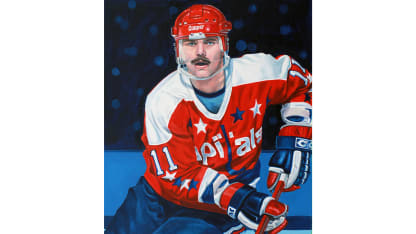
Denis Potvin
